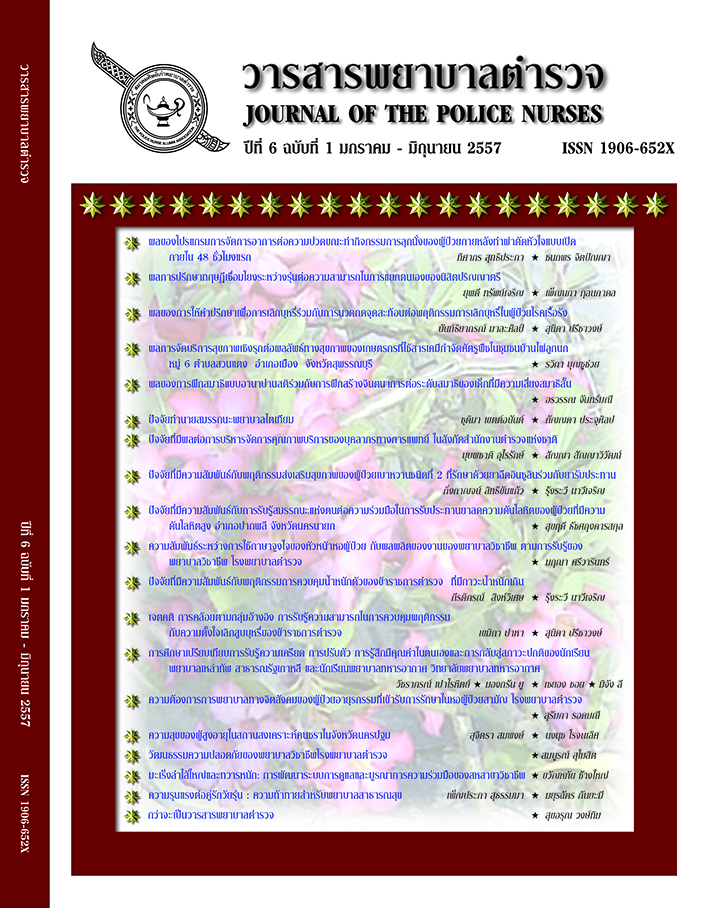เจตคติ การคล้อยตามกลุ่มอ้างอิง การรับรู้ความสามารถในการควบคุมพฤติกรรมกับความตั้งใจเลิกสูบบุหรี่ของข้าราชการตำรวจ
Keywords:
เจตคติ, การคล้อยตามกลุ่มอ้างอิง, การรับรู้ความสามารถในการควบคุมพฤติกรรม, ความตั้งใจเลิกสูบบุหรี่, ข้าราชการตำรวจ, Attitudes, Subjective Norms, Perceive Behavioral Control, Intention to Quit Smoking, Police OfficersAbstract
การวิจัยครั้งนี้มีวัตถุประสงค์เพื่อศึกษาปัจจัยทำนาย ความตั้งใจเลิกสูบบุหรี่ของข้าราชการตำรวจ ตามทฤษฎีพฤติกรรมตามแผนของ Ajzen ตัวอย่างคือข้าราชการตำรวจนครบาลระดับชั้นประทวนที่สูบบุหรี่ อายุ 30-59 ปีจำนวน 100 คน ได้มาด้วยวิธีการสุ่มแบบหลายขั้นตอน (Multi stage random sampling)เครื่องมือที่ใช้ในการเก็บรวบรวมข้อมูลประกอบด้วยแบบสอบถามข้อมูลส่วนบุคคล แบบสอบถามความตั้งใจเลิกสูบบุหรี่ แบบสอบถามเจตคติต่อการเลิกสูบบุหรี่ แบบสอบถามการคล้อยตามกลุ่มอ้างอิงในการเลิกสูบบุหรี่ และแบบสอบถามการรับรู้การควบคุมพฤติกรรมเลิกสูบบุหรี่ วิเคราะห์ข้อมูลโดยใช้สถิติสัมประสิทธิ์สหสัมพันธ์เพียร์สัน และการวิเคราะห์ถดถอยพหุคูณแบบเข้าพร้อมกัน
ผลการวิจัยสรุปได้ดังนี้ เจตคติต่อการเลิกสูบบุหรี่ การคล้อยตามกลุ่มอ้างอิงในการเลิกสูบบุหรี่ และการรับรู้การควบคุมพฤติกรรมเลิกสูบบุหรี่ มีความสัมพันธ์ทางบวกกับความตั้งใจเลิกสูบบุหรี่ของข้าราชการตำรวจ อย่างมีนัยสำคัญทางสถิติ (p < .001, r =.68, .59, และ .73 ตามลำดับ) เมื่อควบคุมตัวแปรอายุ ระดับการศึกษา และจำนวนบุหรี่ที่สูบต่อวัน พบว่า เจตคติต่อการเลิกสูบบุหรี่ การคล้อยตามกลุ่มอ้างอิงในการเลิกสูบบุหรี่ และการรับรู้การควบคุมพฤติกรรมเลิกสูบบุหรี่ สามารถร่วมทำนายความตั้งใจเลิกสูบบุหรี่ของข้าราชการตำรวจได้ร้อยละ 64.6 (p< .001) โดยตัวแปรการรับรู้ความสามารถในการควบคุมพฤติกรรมเป็นตัวแปรทำนายที่สำคัญ (Beta = .444; p < .001) รองลงมาคือ ตัวแปรเจตคติต่อการเลิกสูบบุหรี่ซึ่งมีค่าสัมประสิทธิ์ถดถอย (Beta) เท่ากับ .356 ส่วนการคล้อยตามกลุ่มอ้างอิงในการเลิกสูบบุหรี่ สามารถร่วมทำนายได้อย่างไม่มีนัยสำคัญทางสถิติ
ดังนั้นการส่งเสริมการเลิกสูบบุหรี่ในข้าราชการตำรวจจึงควรให้ความสำคัญกับปัจจัยที่มีอิทธิพลต่อความตั้งใจเลิกสูบบุหรี่ของข้าราชการตำรวจ
คำสำคัญ: เจตคติ; การคล้อยตามกลุ่มอ้างอิง;การรับรู้ความสามารถในการควบคุมพฤติกรรม; ความตั้งใจเลิกสูบบุหรี่; ข้าราชการตำรวจ
ATTITUDES, SUBJECTIVE NORMS, PERCEIVE BEHAVIORAL CONTROL, AND INTENTION TO QUIT SMOKING IN POLICE OFFICERS
Abstract
This study aimed to examine the predictive ability of attitudes, subjective norms, and perceive behavioral control on the intention to quit smoking in police officers. The participants were 100 police officers smokers selected from metropolitan police station through multi-stage sampling. Within the context of Ajzen's Theory of Planned Behavior, attitude, subjective norms, perceived behavioral control, and intention to quit smoking were measured with the self-administered questionnaires developed by the researchers. Data were analyzed using Pearson’s product moment coefficient and Stepwise multiple regressions. The findings indicated that there were significantly positive relationship between attitudes toward quit smoking, subjective norms, perceived behavioral control, and police officers’ intention to quit smoking (p < .001, r =.68, .59, & .73 respectively). Moreover, regression analysis demonstrated that when controlling for age, level of education, and number of cigarettes smoked per day, attitudes toward quit smoking, subjective norms, perceived behavioral control explained 64.6% of the variance in police officers’ intention to quit smoking, followed by the variable attitude toward quit smoking, with regression coefficient (Beta) of .356 is the norm in quitting smoking can predict statistically no significant. The recommendation for interventions nursing practice should focus on the importance of attitudes toward quit smoking, subjective norms and perceived behavioral control in promoting smoking cessation in Police officers.
Keyword : Attitudes; Subjective Norms; Perceive Behavioral Control; Intention to Quit Smoking; Police Officers
Downloads
Downloads
How to Cite
Issue
Section
License
ผลงานที่ได้ตีพิมพ์แล้วจะเป็นลิขสิทธิ์ของวารสารพยาบาลตำรวจ















